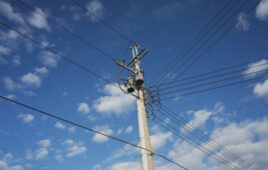Electrical infrastructure provider Quanta Services has entered an agreement to acquire Blattner Holding Company, one of the largest utility-scale renewable energy contractors in North America.
Founded in 1907 and headquartered in Avon, Minnesota, Blattner provides front-end engineering, procurement project management and construction services to renewable energy developers for solar, wind and energy storage projects. Blattner has completed or been awarded more than 300 wind projects (49 GW), more than 90 solar projects (12 GW) and 17 energy storage projects. The EPC ranked No. 2 on Solar Power World’s 2021 Top Solar Contractors list.
“Both Blattner and Quanta are rooted in entrepreneurial, family-operated businesses that are focused on safety and care deeply about their employees,” said Duke Austin, president and CEO, Quanta. “We believe what Quanta is to the electric power solutions industry, Blattner is to the utility-scale renewable energy solutions industry. Together, we will be focused on what we believe are the most attractive areas of the electric infrastructure complex.”
Blattner’s existing management team will remain in place, with company president Scott Blattner staying in his leadership role. Blattner will serve as a platform operating unit of Quanta.
“Our industry is on the cusp of significant evolution and this is an opportunity to add the additional scale and resources needed for our organization to continue leading and delivering certainty to our renewable energy customers,” said Scott Blattner. “Blattner was looking for a strategic partner with the resources and capabilities that will provide us the opportunity to strengthen our market position, take advantage of next-generation opportunities emerging in the renewable energy market and continue to contribute to the long-term success of our employees and customers. To that end, we believe Quanta is the ideal partner for Blattner.”
News item from Quatna Services





“Both Blattner and Quanta are rooted in entrepreneurial, family-operated businesses that are focused on safety and care deeply about their employees,” said Duke Austin, president and CEO, Quanta. “We believe what Quanta is to the electric power solutions industry, Blattner is to the utility-scale renewable energy solutions industry. Together, we will be focused on what we believe are the most attractive areas of the electric infrastructure complex.”
Mergers and acquisitions are part of the overall mix in any business endeavor. As some of The largest energy and electrical companies get involved in alternative energy, we probably will see less “capitalized” entities merging or being taken over by larger cash flush entities. Like a lot of construction companies in the past, these companies are sometimes victims of economy fluctuations. One falters, another takes it place. We have witnessed over the last say 10 years many of the early (large) solar PV companies have risen, faltered and been absorbed or fell away.
The corporate takeover of Real Goods Solar hurt the company’s reputation garnered over some 40 years as a “mom and pop” entity. When Corporate America bought the franchise and name, they exploded buying hundreds of small “mom and pop” solar PV companies. The amount of overhead for sales, service took assets away from O&M and it finally collapsed, John Schaeffer went back to Northern California and his roots. RGS finally fell to bankruptcy. Like Sunrun and the buyout of Vivint another chapter in the History books on solar PV has turned a page. There seems to be a trend of actually going back to small ‘shops’ where their base money maker is electrical and electrician services and solar PV was added under a NABCEP certification program later on. The overall goal is once a solar PV array is installed on the roof of a home, unless that roof is damaged and also the panels, there will be no need to do more than wash down the panels every once in a while. Now there are inverter manufacturers pushing the envelope and designing solar PV inverters with 25 year warranties.
Corporate America is more interested in volume of product and once the market gets into some form of saturation, Corporate America looks for other Regions to conquer. They enter a region, consume and either end up as king of the hill or bankrupt. This is when another cash flush entity shows up and takes over. The EPC business will also suffer these consequences as the construction industry does it’s “breath in”, “breath out”, expansion and contraction the construction industry as a whole experiences.